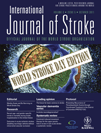IJS announces journal series on stroke, cognition and vascular dementia
Stroke is known to be a strong risk factor for the development of Alzheimer's disease: a history of stroke doubles the risk of incident dementia in the older population (1). In a recent meta-analysis (2), reported estimates of the prevalence of dementia were consistent: 10% of patients had dementia before first stroke, 10% developed new dementia in the first few months after first stroke and 35% had dementia after recurrent stroke. Hypertension and diabetes are recognized risk factors for the small vessel disease underlying lacunar infarction. Lacunes have now been demonstrated to be independently associated with cognitive decline and the development of vascular dementia (3, 4).
Worldwide, the current dementia prevalence of 35 million is predicted to double every 20 years: an expected 66 million in 2030, and 115 million in 2050 (5). The accompanying burden on health care systems, not to mention the grave societal impact of such a large proportion of the population being so disabled or incapacitated, makes this a major global health issue (5–8). Stroke also has considerable burden of disease: annually 15 million people worldwide suffer a stroke, leaving five million dead and another five million disabled (9). Up to two-thirds of people who have a stroke experience cognitive impairments (10, 11), and more than one-third will develop dementia over the subsequent 5 years (12, 13).
With these sobering statistics front of mind, International Journal of Stroke would like to announce a special journal series on stroke, cognition and vascular dementia, the launch timed to coincide with World Stroke Day. We are excited by the opportunity to bring together an issue of focused reviews and new research on this critically important topic.




